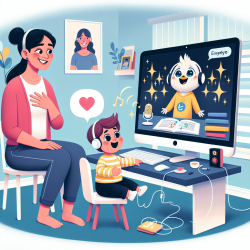Emma Adams, a mother from Ballymoney, was shocked by the long wait her young son, Henry, faced for speech and language therapy (SLT). Concerned about Henry's communication skills, Emma sought help early, understanding that early intervention is crucial.
A recent report revealed that children in Northern Ireland wait longer for SLT compared to the rest of the UK. The Department of Health acknowledged the issue and stated that increasing SLT training places would be considered, but financial constraints pose a significant challenge.
Emma first noticed that Henry was not saying as many words as other children his age at 18 months. She quickly acted, asking her GP for a referral for SLT. Although she received an introductory call swiftly and was given some information to help Henry at home, it took nine months for Henry to be seen face-to-face by a therapist.
Emma praised the speech and language therapists for their dedication but noted the lack of available sessions. Eventually, she found a private therapist for Henry, who has been working with him for two years. Emma's concerns were validated when Henry was diagnosed with an expressive language delay.
Henry, a "pandemic baby,†was just seven weeks old when the UK went into lockdown. Emma believes the lack of social interaction and the widespread use of masks during the pandemic played a significant role in his delayed language development. Henry missed out on key social interactions and the opportunity to observe facial expressions and mouth movements.
Despite these challenges, Henry has made amazing progress, though he still lags behind his peers in communication. Emma is thrilled to see Henry putting two words together, a milestone that means everything to her. She emphasizes that having Henry assessed by a professional and implementing specific techniques tailored to his needs has been a game-changer.
The Royal College of Speech and Language Therapists (RCSLT) reported an 85% increase in the number of children under 18 waiting for SLT in Northern Ireland, from 2,444 in 2021 to 4,527 in 2023. The report also highlighted a rise in complex communication needs among children under five.
Ruth Sedgewick from RCSLT Northern Ireland stressed the importance of early intervention, warning that failing to address these needs early on could have far-reaching consequences. She pointed out that the Covid-19 pandemic and the use of masks significantly hindered children's ability to communicate, as non-verbal cues and mouth movements were obscured.
Other factors, such as increased screen time and parental stress, have also negatively impacted children's communication skills. Screens reduce opportunities for social interaction, which is essential for building communication skills.
RCSLT has called on Stormont to fully invest in early speech and language intervention, noting that there are not enough speech and language therapists to meet the growing demand. Ruth Crampton, another speech and language therapist, highlighted the struggle parents face in seeking additional support. Those who cannot afford private services suffer the most due to long NHS waiting lists, resulting in more children needing longer-term therapy.
Anne Gormley, principal of St Colmcille's nursery in Downpatrick for over 35 years, observed a significant increase in children with speech and language difficulties. These challenges affect children's attention, listening skills, ability to make friends, and overall learning.
Using funding to pay for SLT has made a massive difference in the nursery school. Improved concentration, better behavior, and enhanced learning skills have given children a better chance for a good education as they progress to primary school.
How Teletherapy Can Help
With the growing demand for speech and language therapy, teletherapy offers a viable solution to ensure more children have access to the services they need. TinyEYE provides online therapy services to schools, making it easier for students to receive timely and effective speech and language therapy.
- Accessibility: Teletherapy removes geographical barriers, allowing children in remote or underserved areas to access professional help.
- Convenience: Online sessions can be scheduled more flexibly, reducing waiting times and fitting into busy family schedules.
- Consistency: Regular, consistent sessions can be maintained, which is crucial for effective intervention.
- Engagement: Interactive and engaging online platforms can make therapy sessions enjoyable for children, increasing their participation and progress.
Teletherapy can bridge the gap in service provision, ensuring that every child has the opportunity to develop their communication skills to their fullest potential.
For more information, please follow this link.










